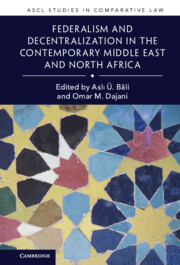Book contents
- Federalism and Decentralization in the Contemporary Middle East and North Africa
- ASCL Studies in Comparative Law
- Federalism and Decentralization in the Contemporary Middle East and North Africa
- Copyright page
- Contents
- Contributors
- Acknowledgments
- 1 Introduction
- Part I Theoretical and Comparative Context
- Part II Decentralization and Governance Reform
- Part III Decentralization and Self-determination
- Part IV Decentralization, Conflict, and State Fragmentation
- 15 Devolution and Federalism in Collapsed States
- 16 The Promise – and Limits – of Stabilization through Local Governance in Libya
- 17 Decentralization in State Disintegration
- 18 Decentralization in Yemen
- Part V Conclusions
- Index
18 - Decentralization in Yemen
The Case of the Federalist Draft Constitution of 2015
from Part IV - Decentralization, Conflict, and State Fragmentation
Published online by Cambridge University Press: 15 January 2023
- Federalism and Decentralization in the Contemporary Middle East and North Africa
- ASCL Studies in Comparative Law
- Federalism and Decentralization in the Contemporary Middle East and North Africa
- Copyright page
- Contents
- Contributors
- Acknowledgments
- 1 Introduction
- Part I Theoretical and Comparative Context
- Part II Decentralization and Governance Reform
- Part III Decentralization and Self-determination
- Part IV Decentralization, Conflict, and State Fragmentation
- 15 Devolution and Federalism in Collapsed States
- 16 The Promise – and Limits – of Stabilization through Local Governance in Libya
- 17 Decentralization in State Disintegration
- 18 Decentralization in Yemen
- Part V Conclusions
- Index
Summary
The chapter explores a paradox – the apparent impossibility of decentralization in a country where orography, a long history of political fragmentation, and a vulnerable central state authority would appear naturally to favor decentralized authority. Through a historical exploration of governance in different parts of Yemen since 1960, it reveals longstanding demands for decentralized governance, as well as the existence of a strong society capable of formulating and pressuring the central authority to implement decentralization reforms. It then analyzes efforts from 2013 to 2015 to produce a new constitutional order built on federal principles – first through a broad-based National Dialogue and, then, through a far less inclusive constitutional drafting process. This quite revolutionary project of founding a federal Yemen with six regions was eventually buried under Gulf Cooperation Council coalition bombs from March 2015 onward. The chapter concludes by exploring the circumstances that led to the rejection of a federalist solution and the eruption of civil war in Yemen, but notes that federalism, far from being an imported concept, has generated rich intra-Yemeni intellectual debates. A six-region federal Yemen might not be the way forward, but a “federalism of the provinces” could be a path for future reconstruction of Yemen.
Keywords
- Type
- Chapter
- Information
- Publisher: Cambridge University PressPrint publication year: 2023



